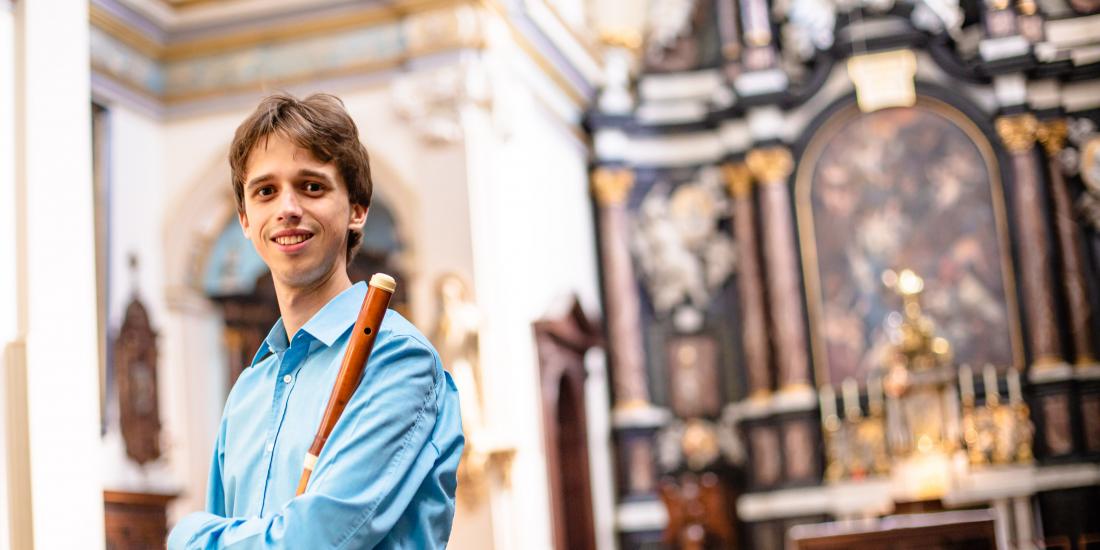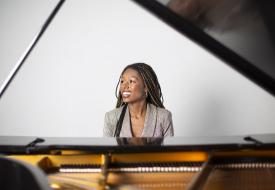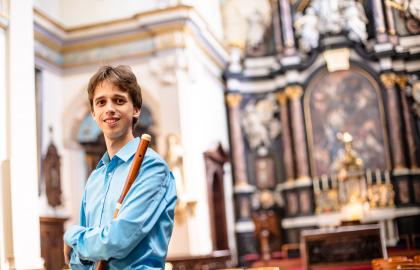You play a lot of instruments. Where does this love of music come from?
My parents love classical music and they had been taking me to the MA Festival (Musica Antiqua) and the Concertgebouw in Bruges since I was seven. The spark for baroque music was soon ignited and I started transverse flute lessons. Six months later, I decided to learn to play the harpsichord as well. I'm very glad that I continued to combine both instruments in the higher conservatoire and up to the present day. For me, it's an ideal cross-pollination. As a harpsichordist and a maestro al cembalo, I also developed a great love for basso continuo on harpsichord and organ, and as a transverse flute player, for the Renaissance flute. Concerts on the recorder and organ solos are project-based outings for me.
What has musicology taught you?
The detailed and in-depth musical analyses, combined with the extensive study of musical history from the Middle Ages to the present day, have given me a rich insight into, and an overall picture of, Western classical music. Because early music, in all its colours and flavours, was also covered in my studies at the conservatoire, that has opened my eyes, ears, interest and appreciation for music from after 1800 in particular in the study of musicology. I also find musicological thinking to be a quality that helps me in the creation and preparation of programmes for Musica Gloria, the study of scores, leading rehearsals, etc.
Can you introduce your ensemble Musica Gloria?
I founded Musica Gloria when I was 12 years old from an urge to make music and perform together with others. The ensemble has evolved hugely and has grown into a young, international early music ensemble, which I now run along with my friend Nele Vertommen. We breathe new life into old musical stories, with an enthusiasm for historically informed performance practice. To this end, we let the score speak to us so as to arrive at our musical choices. Our concert repertoire currently consists mainly of baroque music for all kinds of ensembles. In the near future, we plan to perform Renaissance music (among other things) and we are already dreaming of small and large projects in synergy with other forms of art.
Can you briefly introduce your programme?
The programme includes works by Fasch, Telemann and Bach, with the harpsichord, transverse flute and oboe in particular playing a leading role. These are pieces from the musical library of the court of Anhalt-Zerbst, where Fasch became Kapellmeister in 1722. It will be a varied programme, and besides concertos for the above instruments, we will perform the beautiful sinfonia from BWV 21, a festive overture and a surprisingly beautiful quartet by Fasch.
What is your greatest dream as a musician? Which artist would you like to play with one day?
My most large-scale dream is to perform musical theatre and opera productions with historical staging, and re-enactments of historical events in which music plays a major role, with everything that comes with that (costumes, gestures, scenery, surroundings, etc.). Besides that, I would like to continue teaching and playing in other ensembles. I find it hard to choose one artist that I would still like to play with – there are so many of them! Some that come to mind right now are Vincent Dumestre and Jordi Savall.
What does the Caecilia Prize mean to you? How does it feel to play at the Henry Le Boeuf Hall?
I feel very honoured to receive the Caecilia Prize. I've already been able to collaborate with some of my predecessors, Nicolas Achten, Korneel Bernolet and Reinoud van Mechelen, whom I have looked up to for many years. Secretly, I'd always hoped to be able to take the prize, so the reality of it now is simply amazing!
Being able to play at the Henry Le Boeuf Hall is like a dream come true. I'm looking forward to playing in – and with – this prestigious venue, where so many fantastic artists have given it their all in front of the Bozar audience before.


